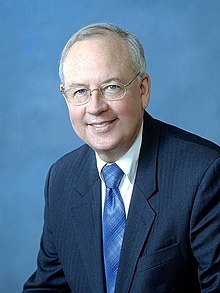Ken Starr | |||||||||||||||||||||||||||||
|---|---|---|---|---|---|---|---|---|---|---|---|---|---|---|---|---|---|---|---|---|---|---|---|---|---|---|---|---|---|
 | |||||||||||||||||||||||||||||
| Independent Counsel for the Whitewater Controversy | |||||||||||||||||||||||||||||
| In office August 5, 1994 – September 11, 1998 | |||||||||||||||||||||||||||||
| Preceded by | Robert B. Fiske (Special Counsel) | ||||||||||||||||||||||||||||
| Succeeded by | Robert Ray | ||||||||||||||||||||||||||||
| 39th Solicitor General of the United States | |||||||||||||||||||||||||||||
| In office May 26, 1989 – January 20, 1993 | |||||||||||||||||||||||||||||
| President | George H. W. Bush | ||||||||||||||||||||||||||||
| Deputy | John Roberts | ||||||||||||||||||||||||||||
| Preceded by | Charles Fried | ||||||||||||||||||||||||||||
| Succeeded by | Drew S. Days III | ||||||||||||||||||||||||||||
| Judge of the United States Court of Appeals for the District of Columbia Circuit | |||||||||||||||||||||||||||||
| In office September 20, 1983 – May 26, 1989 | |||||||||||||||||||||||||||||
| Appointed by | Ronald Reagan | ||||||||||||||||||||||||||||
| Preceded by | George MacKinnon | ||||||||||||||||||||||||||||
| Succeeded by | Karen L. Henderson | ||||||||||||||||||||||||||||
| |||||||||||||||||||||||||||||
| Personal details | |||||||||||||||||||||||||||||
| Born | Kenneth Winston Starr July 21, 1946 Vernon, Texas, U.S. | ||||||||||||||||||||||||||||
| Died | September 13, 2022 (aged 76) Houston, Texas, U.S. | ||||||||||||||||||||||||||||
| Political party | Democratic (before 1975) Republican (1975–2022) | ||||||||||||||||||||||||||||
| Spouse |
Alice Mendell (m. 1970) | ||||||||||||||||||||||||||||
| Children | 3 | ||||||||||||||||||||||||||||
| Education | |||||||||||||||||||||||||||||
Kenneth Winston Starr (July 21, 1946 – September 13, 2022) was an American lawyer and judge who as independent counsel authored the Starr Report, which served as the basis of the impeachment of Bill Clinton. He headed an investigation of members of the Clinton administration, known as the Whitewater controversy, from 1994 to 1998. Starr previously served as a federal appellate judge on the U.S. Court of Appeals for the District of Columbia Circuit from 1983 to 1989 and as the U.S. solicitor general from 1989 to 1993 during the presidency of George H. W. Bush.
Starr received the most public attention for his tenure as independent counsel while Bill Clinton was U.S. president. Starr was initially appointed to investigate the suicide of deputy White House counsel Vince Foster and the Whitewater real estate investments of Clinton. The three-judge panel charged with administering the Ethics in Government Act later expanded the inquiry into numerous areas including suspected perjury about Clinton's sexual affair with Monica Lewinsky. After more than four years of investigation, Starr filed the Starr Report, which alleged that Clinton lied about the existence of the affair during a sworn deposition. The allegation led to the impeachment of Clinton and the five-year suspension of Clinton's Arkansas law license.
Starr served as the dean of the Pepperdine University School of Law.[1][2][3] He was later both the president and the chancellor of Baylor University in Waco, Texas, from June 2010 until May and June 2016, respectively, and at the same time the Louise L. Morrison chair of constitutional law at Baylor Law School. On May 26, 2016, following an investigation into the mishandling by Starr of several sexual assaults at the school, Baylor University's board of regents announced that Starr's tenure as university president would end on May 31.[4] The board said he would continue as chancellor, but on June 1, Starr resigned that position with immediate effect.[5] On August 19, 2016, Starr announced he would also resign from his tenured professor position at Baylor Law School, completely severing his ties with the university in a "mutually agreed separation",[6] following accusations that he ignored allegations of sexual assault on campus.[4] On January 17, 2020, Starr joined President Donald Trump's legal team during his first impeachment trial.[7][8]
- ^ "TaxProf Blog: Pepperdine Dean Ken Starr Named President of Baylor". taxprof.typepad.com. Archived from the original on January 27, 2020. Retrieved January 27, 2020.
- ^ "Ken Starr named dean of Pepperdine School of Law". pepperdine-graphic.com. April 2004. Archived from the original on January 27, 2020. Retrieved January 27, 2020.
- ^ "TaxProf Blog: Tom Bost Named Interim Dean at Pepperdine". taxprof.typepad.com. Archived from the original on January 27, 2020. Retrieved January 27, 2020.
- ^ a b Schuknecht, Cat (January 18, 2020). "After a Fall at Baylor, Ken Starr Became a Fox Regular, and then, A Trump Defender". NPR.org. NPR. Archived from the original on January 22, 2020. Retrieved January 22, 2020.
- ^ "Kenneth Starr stepping down as Baylor chancellor". ESPN. June 1, 2016. Archived from the original on June 2, 2016. Retrieved June 1, 2016.
- ^ "Former Baylor president Ken Starr leaving university's faculty". wfaa.com. Archived from the original on August 20, 2016. Retrieved August 19, 2016.
- ^ Collins, Kaitlin; Brown, Pamela; Liptak, Kevin (January 17, 2020). "Trump adds Ken Starr and Alan Dershowitz to impeachment defense team". CNN. Archived from the original on January 28, 2020. Retrieved January 27, 2020.
- ^ Baker, Peter (January 17, 2020). "Ken Starr Returns to the Impeachment Fray, This Time for the Defense". The New York Times. ISSN 0362-4331. Archived from the original on October 17, 2021. Retrieved January 18, 2020.